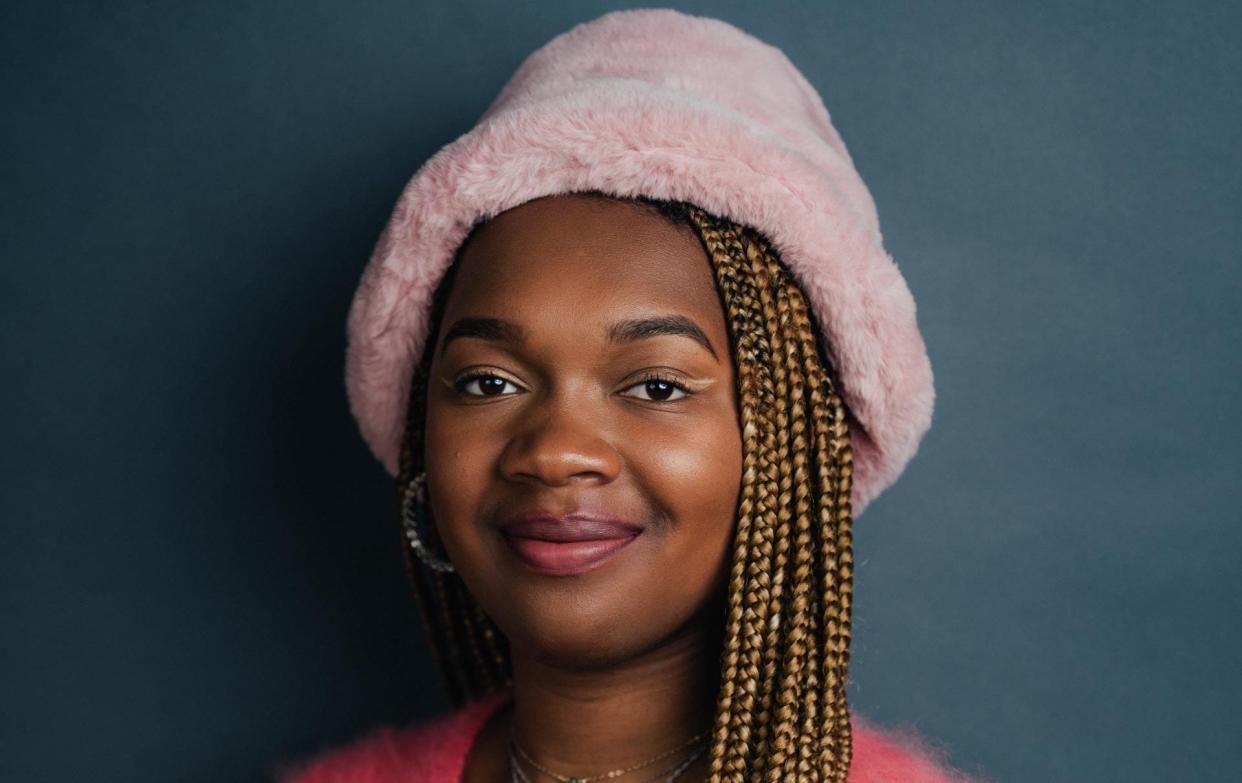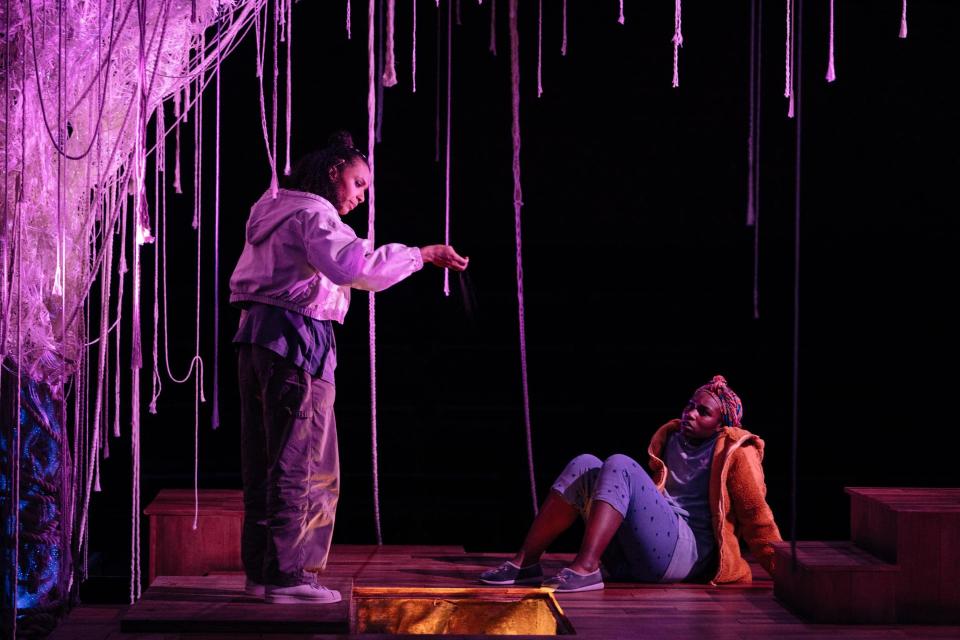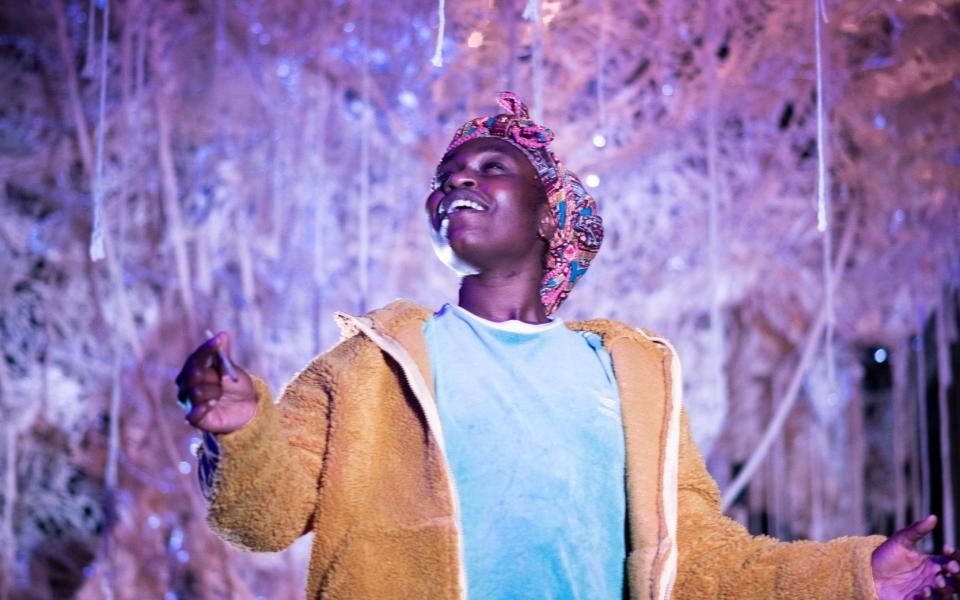‘We can’t fix the past, but don’t lie about it’: Jasmine Lee-Jones on making ‘dangerous’ theatre

If theatre producers want to get more bums on seats, they need to sell theatre as a spiritual experience. That’s the opinion of Jasmine Lee-Jones, one of British theatre’s brightest rising stars. “Going to the theatre is a bit like going to church,” she says. “You get the same feeling of being in a congregation. Everyone respects this code of silence. Everyone shares in it together. You can go on a real journey with someone because of that contract.”
Still only 22, Lee-Jones burst onto the British stage with her debut play, seven methods of killing kylie jenner, which premiered at the Royal Court in 2019, and was an immediate sensation. Taking as its starting point the branding of Jenner as a self-made billionaire, it wittily detonated cultural assumptions around wealth, race, beauty and gender while expertly harnessing the reality-bending prism of the internet. If any play captured the brain-scrambling sensation of living inside a Twitter feed, this one was it.
Audiences couldn’t get enough. It transferred to the Court’s main stage earlier this summer, toured to Australia, and cleaned up at the awards ceremonies, winning Lee-Jones the Most Promising Playwright category at the Evening Standard and the Critics Circle Theatre Awards.
In her acceptance speech for the former, Lee-Jones praised the Court for not laughing in her face when, after spending time with a Royal Court writers group, she produced a 10-minute script about two black women set partly in real life and partly on the internet. (After further development, The Court then commissioned a full-length play.)
Her point was not so much literal as historical, a reflection on the extent to which the commissioning and producing of plays has traditionally been a white pursuit. “If you don’t see yourself represented anywhere, you start to think ‘who am I?’” she says. “Where do I come from? It can create a kind of rage.”

Her new one-woman play Curious, which Lee-Jones also performs, is an attempt to grapple on a personal level with the questions around storytelling, power and colonialism that are currently dominating broader conversations about art. Featuring nine characters, it’s predominantly the story of Jaz, a young gay south-London drama student, adrift in a canon dominated by dead white male playwrights and irked by the fact she and the only other black student in the class share the role of the servant in a student production of a Restoration comedy, while a white actress she nicknames “Rosebud” gets the plum job. “I’m not even gonna lie,” Jaz says at one point. “This whole Restoration project isn’t really my ting.”
Her feelings of invisibility lead her down the rabbit-hole into the more obscure corners of the internet, following in the footsteps of a forgotten 18th-century black actress. It’s a shape-shifting, high-voltage examination of the relationship between culture and identity, and of female sexuality: references to dildos and descriptions of orgasms, porn and periods litter the script.
Lee-Jones was inspired to write it when, at drama school, she came across a throwaway reference to “black buxom widows” in William Congreve’s 1695 Restoration romp Love for Love.
“With the exception of Othello, black people are only ever fleetingly alluded to in the classical repertoire, if they exist at all,” she says. “Going to drama at school at the age of 18 coincided with me coming into my political identity as a black woman and learning about black feminism and my history, and the two clashed because I couldn’t see myself in the repertoire I was doing. People say these plays are universal, but if black people, black women or queer women aren’t represented in the prism through which you look at them, those universal prisms all start to look very similar.”
Yet surely plenty of people from all sorts of racial, economic, gender and sexual backgrounds don’t see themselves represented in the rigidly hierarchical social world that Restoration drama not only inhabits but in many cases subverts? Surely it’s not the job of art to mirror an audience’s lived reality? What exactly is she arguing for?
“I do like plenty of classical plays!” she says. “I did Dido, Queen of Carthage and The Malcontent at the age of 16 with the Globe Young Players and loved it. There are lots of plays set in worlds that I know nothing about, yet in which I can see my humanity. It’s to do with the power of knowing you were there.
“But you could do a whole drama-school training, as I did, and not know for sure that black people even existed [then] in England. Because so many [classical] plays were funded in part by the Atlantic slave trade, so much history has been omitted. As a culture we have to reckon with that void and with the shadow of what isn’t there. Like it or loathe it, we can’t do anything about the past. But what we can do is not lie about it. Because who has the right to tell us what is a lie and what is true?”
I've never seen a playtext with an actual bibliography of memes. What a fine piece of print. @OberonBooks @royalcourt #sevenmethodsofkillingkyliejenner pic.twitter.com/w2AbT3Qn6M
— David Jays (@mrdavidjays) July 16, 2019
Lee-Jones, who grew up in south London and only graduated from Guildhall a couple of years ago, is an immensely thoughtful interviewee, speaking in long, intense, digressive sentences that can take time to unpick. She rejects the easy slogans that tend to shape mainstream conversations around race, for example, and found herself deeply troubled by the BLM protests last summer to the extent she felt unable to engage with them.
“It felt like a lot of people of all races got behind BLM because it had suddenly become a popular cause,” she says. “But police brutality against black people existed long before George Floyd, and a lot of people protesting knew that before last summer. So the question becomes, how do I become active in my support for something and wanting change when the issue is no longer in the newspapers?”
She doesn’t spell it out, but she implies she found a lot of the white support for BLM last summer performative. For Lee-Jones, political and cultural appropriation is a big preoccupation – seven methods deftly skewered the way in which Jenner has made an awful lot of money by appropriating physical traits such as fuller lips that are typically associated with black bodies. In Curious, Jaz takes issue with the ways in which white people appropriate black spaces, in particular Black Pride.
“Obviously it’s important to communicate and have conversations with people of different experiences, but there is also a time when [black queer] people don’t want to explain ourselves, and we just want to be with kinfolk without having to perform,” she says. “It’s a question of: when is it time for us to have our separate moments and reckoning with each other, and when is it time for us to come together?”

She thinks the black queer experience is badly under-documented. “I feel there are a lot more black queer American stories than British ones. Moonlight is the shining example. Most of the films I know that tell black queer British stories are shorts. There is still an invisibility. Society is still very heteronormative, and heterosexuality can feel very compulsory. It can be oppressive even if you don’t realise what's happening.”
Recently she has begun writing for TV, “but I’m very new to it, I’m still at the beginning of learning about it.” You suspect theatre, though, is where her heart lies. What does she think is needed to make it more egalitarian?
“More pluralism. More black writers, actors, directors, more black people doing the marketing. More black people in positions of power. More everything.” What about audiences? “No one wants to admit that it’s sometimes hard to watch theatre. It’s sometimes hard to know what is going on.”
What she loves most is the fact that theatre is live. “It’s both exciting and terrifying. You can’t look away. You can’t press pause. It’s the most dangerous of experiments, because even if what you’re seeing is making you feel uncomfortable, it’s not going to stop.”
Curious is at Soho Theatre from September 16: sohotheatre.com. A filmed version of seven methods of killing kylie jenner is available at the Royal Court website from November: royalcourttheatre.com
